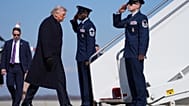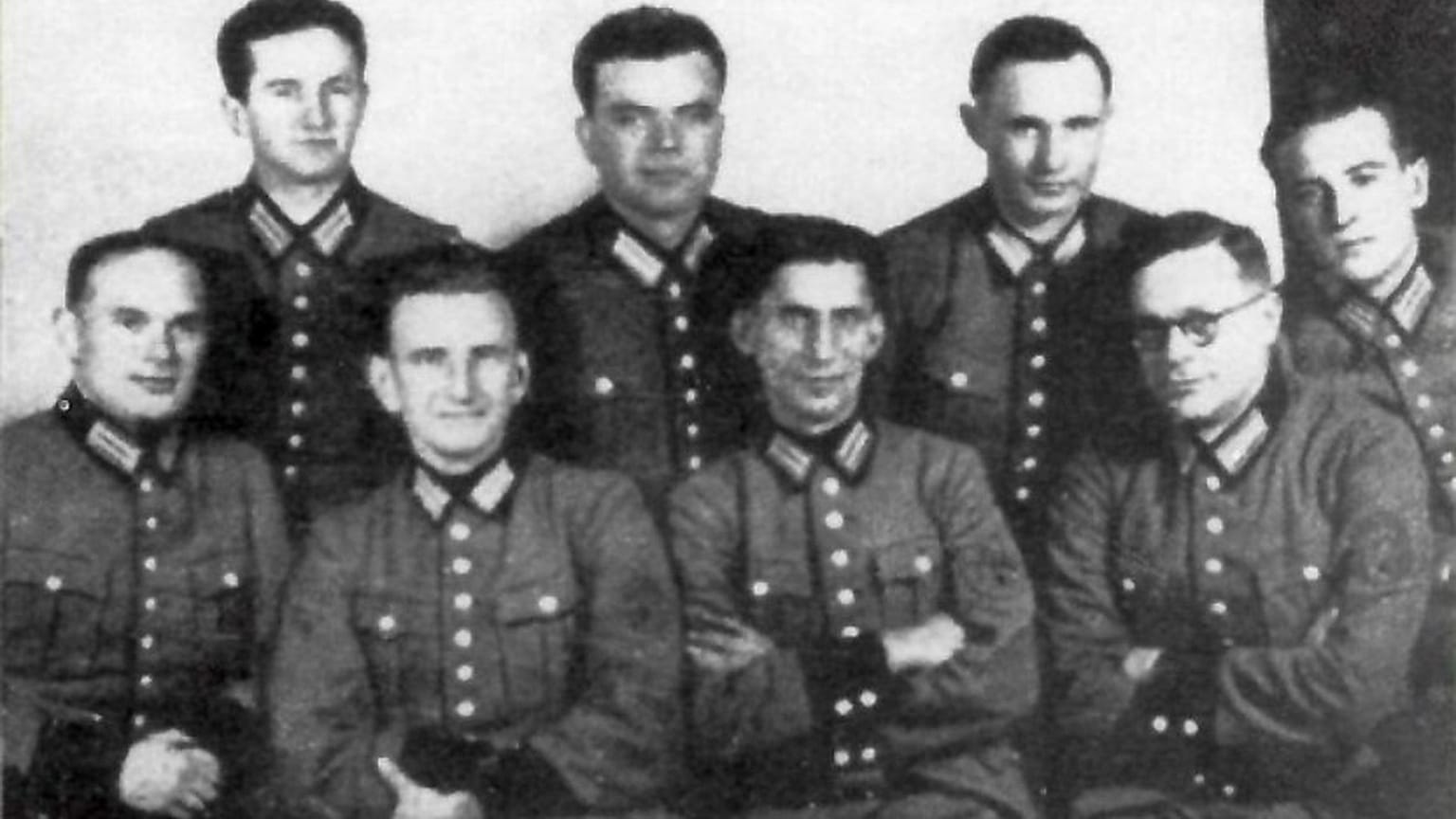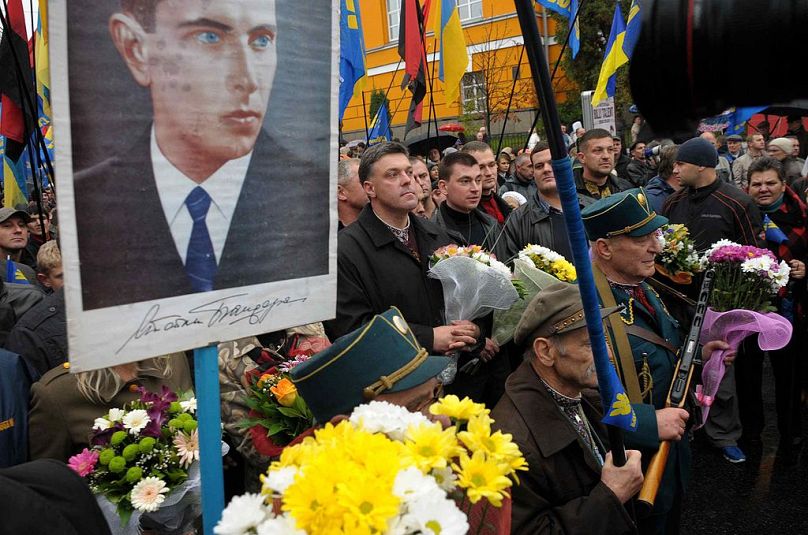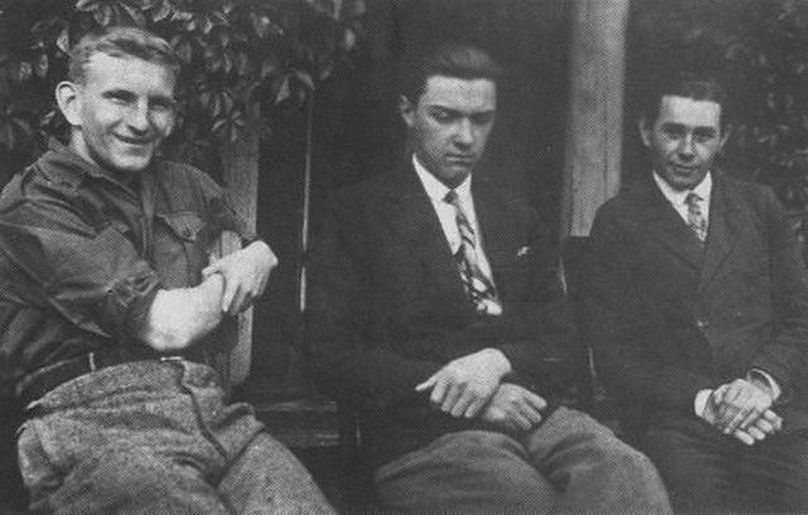Ukraine is considering giving hero status to controversial figures, including Nazi cooperators Stepan Bandera and Roman Shukhevych, who fought for independence in the 1930s and 1940s.
A controversial topic has landed in front of politicians in the Ukrainian parliament and is getting international attention. Seventy-eight Ukrainian lawmakers from all sides of the parliament have proposed to give the title ‘Hero of Ukraine’ to controversial figures such as Stepan Bandera and Roman Shukhevych.
 ADVERTISEMENT
ADVERTISEMENT
 ADVERTISEMENT
ADVERTISEMENT
Some Ukrainians see them as war heroes who fought for Ukrainian independence back in the 1930s and 1940s.
For others, they are antisemitic war criminals who took part in the mass killings of up to 100,000 Jews and Poles during WW2 in Volhynia and Eastern Galicia.
The proposal also asks the Ukrainian Parliament and the country’s president Volodymyr Zelenskyy to commemorate the Ukrainian Insurgent Army, UPA, operating from the 1940s and into the 1950s, on their 80th anniversary in October next year.
It also includes the suggestion of constructing memorials and the issuing of coins and stamps, “dedicated to the 80th anniversary of the Ukrainian Insurgent Army, as well as to Stepan Bandera, Roman Shukhevych, and other UPA commanders.”
The Ukrainian parliament will now consider the proposal, which is expected to meet fierce reactions from Poland and Israel if adopted.
Bandera was named ‘Hero of Ukraine’ back in 2010 by outgoing president Viktor Yushchenko, which sparked protests from Poland and Israel before Bandera was stripped of the status again in 2011.
‘Extremely contested’
Pavlo Kutuev, the chair of the sociology department at Igor Sikorsky Kyiv Polytechnic Institute, tells Euronews that the move by the 78 lawmakers is indeed controversial.
“This question is extremely contested and is dominated by ideological visions,” he says.
“It is used to mobilise supporters, and I would say that it is counterproductive in Ukraine’s relations with countries such as Poland but also in integrating society. They are heroes in western Ukraine, but they have different ones in eastern Ukraine.”
“I believe that what we see now is an attempt to run on the patriotic ticket by Zelenskyy’s party and trying to capture more voters,” says Kutuev.
A controversial topic
Bandera, Shukhevych, and the UPA are controversial for several reasons. Critics point to the mass killings of up to 100,000 Jews and Poles and the fact that UPA cooperated with Nazi Germany at the beginning of WW2 until it became clear that Nazi Germany wouldn’t recognise Ukrainian independence.
Others see them as heroes fighting for independence and accuse Poland of mass killings and deportation of Ukrainians in the 1940s.
The view of the UPA is also split inside Ukraine. A study carried out this year by the Democratic Initiatives Center shows that 80 per cent of Western Ukrainians are positive about the Ukrainian government recognising the soldiers of the UPA and their fight for Ukrainian independence.
In contrast, only 25 per cent are supportive in eastern Ukraine. The study also shows that 70 per cent of western Ukrainians have a favourable view of Bandera as a historical figure, while that number is 11 per cent in eastern Ukraine.
Sviatoslav Yurash is a member of the Ukrainian parliament for the President’s party ‘Servant of the People’ and is one of the 78 lawmakers supporting the proposal. He tells Euronews that he understands that the proposal is controversial and says that he is not arguing against the atrocities committed by members of the UPA towards Jews and Poles. However, he argues that Bandera should be remembered for his fight for independence.
“They are controversial; I agree with that,” Yurash says, “(But) they said that we don’t want to be a puppet or an instrument. We want to be an independent state. The story here should be remembered, but we should also not forget all the problems. However, their goal was very clear - an independent Ukraine. And it is worthy of giving stamps and coins for.”
Yurash says that it should be made clear that Bandera and the UPA aren’t receiving the honour due to the atrocities committed but for their role in the Ukrainian fight for independence. It also doesn’t exclude remembering horrors such as Babi Yar - the mass killings of Jews by Nazi Germany in the Ukrainian capital Kyiv. The Ukrainian government is planning to build a large memorial in remembrance of Babi Yar.
“I do not disagree that we should remember, examine and acceptably apologise for horrible deeds done, but so did the other side. Efforts and deeds of the Polish movement in Ukrainian villages - displaced and destroyed. Focus on this (blaming each other) is wrongheaded, and I think that will be a mistake. We have a bear in the East that we should focus on,” says Yurash.
Creating a national identity
The “bear” Yurash is referring to is Russia, where he sees the real enemy. In 2014, Russia annexed the Ukrainian peninsula Crimea, and a war between Ukraine and Russian-backed separatists broke out in eastern Ukraine.
It has claimed more than 13,000 lives, according to the UN. Recently, Russian President Vladimir Putin published an essay where he argues that people living in Ukraine, Belarus, and Russia are essentially the same people and that Russia will never accept the anti-Russia movement in Ukraine.
Russia’s view of Ukrainian independence scares Yurash and makes it essential to celebrate the people who historically fought for Ukrainian independence, such as Bandera. However, Yurash says that people considered heroes in eastern Ukraine also deserve recognition.
“We should move beyond national heroes. We should look at what unites Ukraine, like our values, which are agreed upon in the West and East. It is our values that, like glue, bring us together. The respect for civilian and spiritual institutions and liberty,” he says.
Professor Kutuev explains that Ukraine is still working on its national identity-building process after the country emerged after the collapse of the Soviet Union.
“Ukraine has had to break with its Soviet past and kind of underline its own identity, which has made it turn to figures considered anti-Soviet and anti-communist. On the one hand, it is a natural development, but on the other hand, it could be dangerous because it could amplify the different views within Ukraine,” he says.
Kutuev argues that Ukraine still lacks the academic examinations of certain historical events and a public debate about its past.
“I am not saying that Bandera does not deserve this historic status, but that the government should be more careful because he is not a hero for every Ukrainian citizen.”
It is still unclear what President Zelenskyy thinks of the proposal. The Kyiv Post writes that he previously has said that Bandera is a hero for some Ukrainians.
“He is one of the people who defended Ukraine’s freedom,” Zelenskyy said in 2019.
“He is a hero for a certain percentage of Ukrainians, and it’s normal, and it’s cool.”
The Ukrainian parliament is currently on summer break and resumes work in September. The proposal is unlikely to be reviewed before then.
Every weekday, Uncovering Europe brings you a European story that goes beyond the headlines. Download the Euronews app to get a daily alert for this and other breaking news notifications. It's available on Apple and Android devices.
















